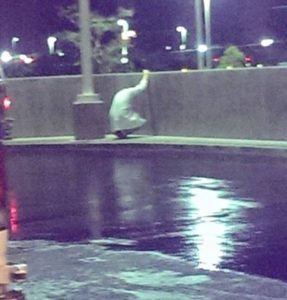July 22nd, 2020
Patient Death and Physician Grief
Prarthna Bhardwaj, MD
A few months ago, one of my colleagues spoke about ‘Patient Death and Physician Grief’ at a morning conference — somewhat unusual, considering our conferences largely revolve around medical topics. I was stunned by how the next hour unfolded that morning.
The session started off like a traditional morning report with an opening line of the case. Except, we did not dive into a differential diagnosis or dwell on clinical reasoning. The resident spoke about a teenager who had presented after an out-of-hospital cardiac arrest. He had died, despite the best efforts of a solid team. It had deeply affected the resident, as he missed the opportunity to fully process it on a busy night.
The first activity for the session involved desk partners sharing stories of patient deaths that affected them. Every single resident shared a story. Even normally quiet residents were suddenly talking.
I will embarrassingly admit that I cried a little, recalling one cold winter Thanksgiving day when my patient — a young woman with a toddler, had died of a brain bleed that was too deep for intervention. I took care of her for less than 24 hours, with no opportunity to connect with her as she was comatose on arrival to the hospital. Yet, that one incident affected me so deeply that I vividly remember every detail from that day, 2 years later. I tried to reason out why it affected me — was it because she was nearly the same age as me? Was the sorrow too difficult to bear during the holiday season? Was it the haunting image of her baby’s hushed sobs echoing along the walls of the empty hallways of the medical ICU? Or was it simply hormonal?
I looked around and saw a lot of tears as residents shared their experiences with the larger group. In that 1 hour, everyone allowed themselves to be vulnerable while recounting difficult experiences of taking care of patients who had died and how they coped with patient death. Even though we have mental health support and spiritual services in place at our institution, no one had paused to seek help to cope.
“Never get close to your patients”
We repeatedly read these lines in books and watch it on television medical dramas! The hidden curriculum of this stoic profession teaches us to distance ourselves and create protective boundaries. Feeling and displaying too much emotion is regarded as unprofessional and a sign of weakness. As Dr. Elaine Kasket from London Metropolitan University eloquently stated, “It feeds into this popular image of the physician as some kind of superhuman ultimate rescuer of human life; unable to do his or her job if they give in to or even acknowledge their emotions.”
This notion was perhaps also born out of the necessity to shield us from the constant emotional brunt associated with poor patient outcomes like death. However, are we really shielding ourselves from the emotional toll if we maintain our distance?
As trainees, we are thrown into a strange world in which death is often an unwanted visitor. Although it is a frequent visitor, each experience is still jarring. While feelings of grief are normal when we lose patients in our care, they can simultaneously be confusing and even uncomfortable. Clearly medical school has not prepared us for this possibility. However, it is imperative for us to ‘heal’ promptly to go back to doing what we purpose our lives around – saving patients!
Why do we need to validate feelings of grief?
In a nutshell, unprocessed or disenfranchised grief is traumatizing. Feeling like we aren’t living up to society’s unwritten rules about grief can lead to isolation, shame, and guilt. Our profession punishes doctors for grieving and restricts the medical licenses of those seeking mental health care. So rather than process grief, many physicians turn to alcohol, drugs, or firearms. This, in turn, diminishes personal well-being, resulting in moral distress and soaring physician suicide rates.
At the helm of a raging pandemic, this is an even more pervasive issue — healthcare professionals across the globe have recounted countless horror stories of patient deaths. This will no doubt have dire consequences in the years to come on the mental health of our community.
We have to do better
Adding a suicide help line and starting wellness committees are far from a systemic cure. It is a start, but we need more concrete steps to support physician trainees through this process.
1. A weekly debrief for all teams
Every program should have a consistent plan in place for a weekly debrief for all teams. This is especially important in the intensive care units. Feelings of grief need to be discussed freely and openly. Attending physicians ideally should take the lead to initiate these debrief sessions, which could help normalize this process.
2. Self-Reflection
My program designed a self-reflection curriculum that allows trainees to indulge in the practice of deliberate self reflection. Although this might not suit everyone, it helped several trainees tune in to their inner self. Various activities like journal writing, artwork, and group debriefs have allowed us to slowly but willfully identify our deepest fears and our proudest accomplishments. It has also been strangely gratifying to learn that we can come from different countries, backgrounds, and cultures and yet face the same struggles about patient death.
3. Mandatory Therapy Sessions
Having the option of professional mental health services is simply not adequate. Physicians are terrible about voluntarily seeking help. Every residency program should have mandatory in-house and free therapy sessions for their trainees at least 2 times a year. We need to normalize this process to avoid instilling feelings of guilt and inadequacy among physicians. ACGME, I hope you are listening.

A picture is worth a thousand words: A picture (that went viral on Reddit a few years ago) of a young ER doctor overwhelmed by grief after losing a 19-year-old patient
As the hour long session on ‘Patient Death and Physician Grief’ ended, despite the melancholy, all residents left the room feeling better than when they entered. As one of them put it, sharing stories with “someone else who gets it” was therapeutic.
None of us will forget the first patient who died under our watch, because knowingly or unknowingly, they are a part of the physicians we are today. For too long, we have been encouraged to stifle our feelings and to toughen up. Instead, let’s acknowledge our sense of loss and learn from it. After all, it is the human thing to do.
*Some patient encounter details have been modified





I came across this blog accidentally, in a time when me myself was grieving my patients deaths! This week has been particularly difficult seeing many ppl dying of respiratory distress. Parents of young doctors ( who might have acted as asymptomatic Carriers of covid19) dying of ARDS, and their helpless guilty faces. Teenagers assuring dying fathers that they need not worry about the rest of the family and promise to take care of everyone else in the family, in the hope of giving them an eternal peaceful rest! Relatives of terminal patients pleading us to stand bythem for a few more minutes for mental support, even though they know we can’t do anything more to save their patient, and we are forced to deny their request because of the never ending line of patients yet to be attended… ofcourse sleep deprivation, rashes and blisters by using PPE , physical exhaustion all troubles us, but the emotional troubles by the death of patients lasts longer than the others…..
Dr. Panicker: I could not agree more. This has not been an easy time for anyone, especially physicians when it comes to emotional trauma of dealing with mass deaths and sickness. Thank you for sharing.
Stay safe and lean on your colleagues and friends for support!
That was healing.
Thank you, Dan!
Measurement of serum salicylate level
This topic needs to be addressed esp. in such situations where the physicians are working in a challenging environment. Mental health wellbeing of physicians is a must.
I agree wholeheartedly.